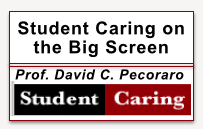Professor, David C. Pecoraro
Stories about student caring may be found in many areas of our world today. Stories are, a very effective way to communicate the principles of student caring. When a story is told, in a motion picture, there is added meaning, intensity, and emotions. Every aspect of the film is planned and filmed to perfection. In post-production editing, it is further refined and music is added to trigger our feelings.
We can find examples of student caring in many films. The films provide us with examples of teacher, student relationships. Some of them promote student caring and some provide us with examples of abuse. These stories are told as comedies, as in; “Back to School” starring Rodney Dangerfield; sports, “Rudy” starring Sean Astin, action and adventure, the Harry Potter series; and dramas, such as; “The Dead Poet’s Society”, “Mr. Holland’s Opus,” and “Pay it Forward.” No doubt, many others come to the readers mind.
In this article, my focus is on a film which illustrates, a professors devotion to his profession and integration of caring with teaching excellence. Underling all all of this is the professors focus on the student’s future, well beyond college. His students success is evidence of this. The film I am speaking about is, “The Great Debaters.” In this, from Oprah Winfrey’s Harpo Films produced work, directed by and starring Oscar winner, Denzel Washington, we experience the true story about Professor, Melvin B. Tolson (1898 – 1966) of Wiley College, Texas in 1935. As the camera takes us to Marshall, Texas, we hear these words:
Freshman class… l believe we are the most privileged people in America, because we have the most important job in America: the education of our young people.
Professor Tolson, the college’s debater professor, taught and inspired his debate students to debate. They were so successful, that the team, which went on to challenge the University of Southern California (USC), for the national championship. Not only did they win, they remained undefeated for the next ten years. In the film, Harvard, was the site of the final debate scene, as explained by Denzel Washington on the films official site.
Teaching Excellence. Tolsen, literally, as students are trying out for the debate team, challenges them to stand in the “hot spot,” letters which he drew in chalk on the floor of his home. One by one, he verbally challenges the students to discover their strengths, to learn, and to know, what they do not.
He delivered short, meaningful sayings, much like his poetry, to encourage his students; “My message to you is to never quit.” “You are gifted, all of you.” “You are my students, I am your teacher, I think that’s a sacred trust.”
Student Caring During a debate lesson, Tolsen asks student, Mr. Lowe to “tell us something about your father.“ Lowe retorts, “Why don’t you tell us something about your father?” Tolsen, seizes this as a teaching opportunity and after a powerful lecture, closes with, “l…and every other professor on this campus are here to help you… to find, take back, and keep your righteous mind… because obviously you have lost it. That’s all you need to know about me, Mr. Lowe. Class dismissed.”
What’s wrong with revealing some personal information? Nothing. Tolsen knew that the student was not really interested in his father, rather he did not want to be put on the spot and / or talk about his father. The key points here are two-fold. One, the professor was challenging the student to leave their comfort zone and to learn by doing. Two, the situation presented an opportunity for the professor to reply, which included, his genuine and true desire for the student to know that his, and his colleagues, primary interest was in educating him.
Integration of caring with teaching excellence. Throughout the film, we see Tolsen demonstrate caring while educating, very effectively. He does this by partnering with his students. Tolsen would write to other schools to arrange for the debates, for his students, then rejoice with them when they were invited and ultimately win the debate. When his students were struggling with issues, either in the classroom, or without, he would find a way, while educating them about debate, to address their issues and help them work through them. In a scene, near the end of the film, Professor Tolsen, choked up with pride as he silently watches his students win the great debate with Harvard.
Debate coaches, arts professors, and those who instruct students toward competitive or performance related events can experience great rewards from their student’s successes while they are still with them. Rewards of far greater value are realized following the students time with the professor. Student, James Farmer Jr., went on to become a leader in the civil rights movement. Student, Samantha Booke became a lawyer. Student, Henry Lowe went on to become a minister.
This true story takes us through the academic year, 1935 – 1936. Along the way, we watch his students transform from doubt and uncertainty to confidence and victory. Thank you professor Tolsen for inspiring us!
Copyright 2012, Professor, David C. Pecoraro, MFA
Monday, July 15, 2013
Student Caring – On the Big Screen – What is your favorite Higher Education Movie?




Jason Myrowitz, Fran Cherkis and 1 other like this
13 comments
Follow Dick
Dick Teach • “Good-by Mr. Chips”
JasonUnfollow
Jason Myrowitz • Finding Forrester
Follow claribel
claribel young • How about “To Sir With Love?”
ChristopherUnfollow
Christopher Johnson • I vote for “Horse Feathers” (Marx Brothers, 1932), with Groucho Marx as a college president and Chico and Harpo as football players.
1
Follow Terry
Terry Wansor • Even though most movies offer unrealistic portrayals of college experiences, both social and educational, I really enjoyed “Animal House” (for the satiric hyperbole) and “The Paper Chase” (for portraying collisions between personal and institutional/societal needs).
Follow Maryann
Maryann Whitaker • “Legally Blonde” because it’s just fun.
Follow Connie
Connie Phillips • “The Paper Chase”, and loved the television series as well, both showed law school professors as tough, great educators who cared about their students.
Follow Fran
Fran Cherkis • A Beautiful Mind is great for illustrating how the mind can work both positively and negatively. Have used this in class with great feedback.
Follow Patricia
Patricia Hagen • Educating Rita because it points to multi-leveled changes
Follow Louis
Louis Schmier • Educating Rita.
Follow Dolores
Dolores Reid-Perry • The Human Stain. Because as Roger Ebert says “not many movies probe into matters of identity or adaptation. Most movie characters are like Greek gods and comic book heroes: We learn their roles and powers at the beginning of the story, and they never change. In this movie there are complex, troubled, flawed people, brave enough to breathe deeply and take one more risk with their lives”. An excellent film.
Follow Christine W
Christine W Hendricks • To Sir With Love because of the great example “Sir” provided to his students and how they absorbed it and made it part of their lives. It turned their lives around. Great teachers can do that.
StanleyUnfollow
Stanley Chu • Although ‘Stand and Deliver” is about high school, it inspired me to continually challenge my students and to keep my expectations/standards high.